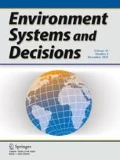Summary
Even though there are no examples of outstanding success when comparing national environmental policies, insights can still be gained by studying their relative success in terms of environmnetal quality. The starting point of this study is the hypothesis that the material, institutional and socio-cultural capacity of a country are more relevant in determing the outcome of environmental policies than its choice of policy instruments.
Institutionally, the openness of the judicial, political, informational and economic systems for innovation is as important as a country's capacity for stategic action. Culturally, a tradition of consensus building strengthens both openness and the integration of politics and thereby reinforce the institutional conditions for relative success.
Similar content being viewed by others
References
Göhler, G. 1987.Grundfragen der Theorie Politischer Institutionen. Westdeutscher-Verlag, Opladen.
Hirsch, M. 1986. Tripartism in Luxembourg: the limits of social concentration.West European Studies,91.
Huntington, S.P. 1965. Political development and political decay.World Politics,7(3).
Inglehart, R. 1988. Politsche Kultur und stabile Demokratie, In:Politische Vierteljahrsschrift,29(3), Jg.
Jänicke, M. 1989a. Ökologische und ökonomische Wandlungsmuster im Industrieländervergleich. In: Hartwich, H.H. (ed.),Macht und Ohnmacht Politischer Institutionen. Westdeutscher-Verlag, Opladen.
Jänicke, M. 1989b. Über die Widersprüchlichkeit des Staates in der Umweltpolitik. In: Grebing, H., Brandt, P. and Schulze- Marmeling, U. (eds),Sozialismus in Europa: Bilanz und Perspektiven. Festschrift für Willy Brandt. Klartext-Verlag, Essen.
Jänicke, M. 1990.State Failure. The Impotence of Politics in Industrial Society. Polity Press, Cambridge.
Jänicke, M. and Mönch, H. 1988. Ökologischer und wirtschaftlicher Wandel im Industrieländervergleich. Eine explorative Studie über Modernisierungskapazitäten. In: Schmidt, M.G. (ed.),Staatstätigkeit. Special issue No.19,Politische Vierteljahresschrift. Opladen.
Jänicke, M. and Mönch, H. 1990.Ökologische Dimensionen wirtschaftlichen Strukturwandels. Eine Untersuchung über 32 Industrieländer, Free University of Berlin, Forschungsstelle für Umweltpolitik, FFU Rep.90-10.
Katzenstein, P.J. 1985.Small States in World Markets. Industrial Policy in Europe. Cornell University Press, Ithaca and London.
Kitschelt, H. 1983.Politik und Energie: Energietechnologiepolitiken in den USA, der Bundesrepublik Deutschland, Frankreich und Schweden. Campus, New York and Frankfurt/M.
Lamm, J. and Schneller, M. 1989. Umweltberichterstattung im internationalen Vergleich. Unpublished manuscript, Free University, Berlin.
Lehner, F. and Nordhause-Janz, J. 1988. Die politische Ökonomie gesellschaftlicher Verteilungskonflikte: Möglichkeiten Grenzen und Defizite staatlicher Wirtschaftspolitik. In: Schmidt, M.G. (ed.),Staatstätigkeit. Westdeutscher-Verlag, Opladen.
OECD. 1988.Transport and the Environment. Paris.
Pearce, D. 1989.Blueprint for a Green Economy. London.
Prittwitz, V. 1990.Das Katastrophenparadox. Elemente einer Theorie der Umweltpolitik. Westdeutscher-Verlag, Opladen.
Reich, M.R. 1987. Mobilizing for environmental policy in Italy and Japan.Comparative Politics,64(4), 379–401.
Scharpf, F.W. 1985. Die Politikverflechtungsfalle: Europäische Integration und deutscher Föderalismus im Vergleich.Politische Vierteljahresschrift,26(4).
Scharpf, F.W. 1987.Sozialdemokratische Krisenpolitik in Europa. Das "Modell Deutschland" im Vergleich. Campus, New York and Frankfurt/M.
Schmidt, M.G. 1986. Politische Bedingungen erfolgreicher Wirtschafspolitik.Journal für Sozialforschung,26(3).
Schmidt, M.G. 1988.Sozialpolitik Historische Entwicklung und internationaler Vergleich. Leske and Budrich, Opladen.
Weidner, H. 1988. Vom Ausland lernen. Anregungen aus Japan. In: Simonis, U.E. (ed.),Lernen van der Umwelt — Lernen für die Umwelt. Sigma, Berlin.
Author information
Authors and Affiliations
Additional information
Dr Martin Jänicke is Professor of Political Science at the Free University of Berlin. He is also Director of the Research Institute for Environmental Policy (Forschungsstelle für Umweltpolitik) at the University. The manuscript of this paper was received before the date of re-unification of Germany and events altering the status of the USSR.
Rights and permissions
About this article
Cite this article
Jänicke, M. Conditions for environmental policy success: An international comparison. Environmentalist 12, 47–58 (1992). https://doi.org/10.1007/BF01267594
Issue Date:
DOI: https://doi.org/10.1007/BF01267594




